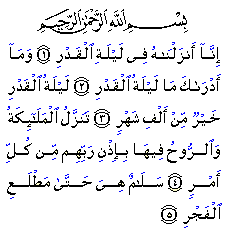Time to Cry! Purifying Heart, Qiyas
Issue 445 » September 28, 2007 - Ramadan 16, 1428
General
| Living the Quran |
Surah Al-Qadr (The Power) Half of Ramadan is gone. We powerless people will soon be looking for the Night of Power (Laylatul Qadr), which we are advised to seek in these last ten nights of Ramadan. We can't afford not to be crying in front of Allah, the Merciful, All-Aware. Tears flow when we remember how much Allah has blessed us with and how much we disobey Him. We can never repay Allah for everything we have, yet we still blatantly commit sins both big and small: whether it's backbiting, hurting other human beings, not standing up for the truth, treating our family badly, lying, doing good deeds to show off, cheating, etc. Abdullah ibn Umar, may Allah be pleased with him, said he would rather shed two tears from the fear of Allah than give a thousand dinars in charity. And the most telling example of a man who few would think would cry because of Allah is Umar, may Allah be pleased with him. He was known for being strong, fearless, and uncompromising when it came to matters of faith. Yet, Abdullah ibn Isa said that Umar had two black streaks on his face because of constant weeping. He feared Allah so much that he once said, "If someone announced from the heavens that everybody will enter Paradise except one person, I would fear that that person would be me." Umar was one of the strongest believers. Yet he cried and feared Allah. And Abu Bakr, he was simply known for his crying. These people loved to serve human beings in the day and spent time begging God to save humanity at night. May Allah be pleased with them. Let's be more contemplative and pray for an awareness of and forgiveness for our sins, as well as softness in our hearts. If Umar the brave and pious did it, we have even more need and urgency to do it. Human beings are in turmoil. Connecting with God with our hearts and begging for His Mercy for His Creation will bring us Closer to Him and human beings. Source: |
| Understanding the Prophet's Life |
Purifying the Heart In a hadith narrated by Zayd bin Thabit and Ibn Masud, who were both among the scholars from the companions, the Messenger of Allah (peace be upon him) said: "Three things purify the heart of a Muslim: the sincerity in working for the sake of Allah, taking up the task of advising the rulers, and not departing from the group of Muslims." In order to implement this principle on a personal note, I say that it is not my wish for any Muslim to be harmed because of me overtly or covertly. This applies to all Muslims, but more specifically to our companions and acquaintances. Neither do I want any of them to be blamed or condemned, as they are still worthy of honour and respect. Indeed, man does not escape being classified into one of three categories: a correct mujtahid, a wrong one, and a sinner. The first is rewarded and praised; the second is rewarded yet forgiven for his blunder. Regarding the third, I ask Allah to forgive him, us and the rest of the Muslims. Therefore, we shall turn a new leaf on those who had erred and not fulfilled this aforementioned principle. Yet I know of some who say "this man erred" and "this man did not do what he should have", or "the Shaykh was harmed because of this man." Those words that have harmed some brothers I do not condone, nor do I pardon those who utter them. You should also know that we are all joining to assist one another. It is obligatory upon us to aid each other, more so now than before. So, whosoever thinks that harming some brothers as a result of the hardship experienced in Damascus and Egypt is justified is mistaken. It is true that a believer to a believer is like the two hands - one cleans the other. And it is also true that some kinds of dirt can only be washed away by hard scrubbing, yet this treatment will be justified when the outcome appears to be the restoration of that brotherly love. Let no one think that the believer can be miserly in helping their brothers, and in aiding them. If some of our companions had neglected us before and they came to aid us now, their status will rise higher than before. You might also know - may Allah be pleased with you - that issues like this one often occur due to a difference of opinion and variations that might even befall the people of Iman due to the whispers of satan. Source: |
| Islamic Vocabulary |
Qiyas Qiyas is a method that uses analogy – comparison – to derive Islamic legal rulings for new developments. This is a key method to ensure contemporary relevance of Islamic Shariah. Needless to say, this tool should not be employed carelessly and requires Scholarly attention. For details refer to Source: |
